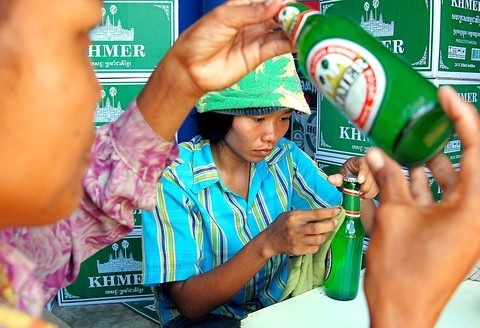In a hut built from the leaves of Cambodia's famed sugar-palm tree, a worker sloshes suds into used glass bottles, readying them to be filled with a unique local brew made from the bountiful tree: sugar palm beer.
The labels of international beer brands are scrubbed off bottles by some of the 20 staff here and replaced with stickers bearing the name "Khmer" featuring an image of Angkor Wat and two spiky sugar palms, Cambodia's national tree.
"We are nationalists who love the palm tree ... and this is a tree that can help reduce poverty," Pok Leakreasey says enthusiastically, referring to the 35 members of the local Club of Palm-Tree Lovers who set up the enterprise he directs.

PHOTO: AFP
The cider-like concoction, made from the tree's sap, has a sweet yet mouth-puckeringly tangy flavor. Distribution around the country is widening.
The brew is the brainchild of the club, whose members fear that the tree dotted across the emerald rice paddies of the kingdom, one of the world's poorest countries, is under threat.
Extra cash

PHOTO: AFP
With more than a third of Cambodians earning less than a dollar a day, the US$5 they are paid to sell the wood of a single sugar palm tree to businessmen is an easy way to earn extra cash. Though there are no official figures, reports say clusters of trees have been cut down in the provinces of Kandal, where Daun Mann is located, and neighboring Kampong Speu.
Traditionally, villagers used the sap tapped from the stems where the tree's fruit and flowers grow to make distinctively-flavored palm sugar, an essential addition to spicy curries and other Cambodian specialties. But increased competition from white cane sugar imported from neighboring Thailand, along with the spiralling cost of the firewood needed to help produce the palm sugar, means the trees have lost their luster.
So in 1999, the club successfully persuaded villagers at Daun Mann, a settlement about 30km west of Phnom Penh still studded with sugar palms, to use the sap to make vinegar. Then last year they hit on the tastier idea of using lightly fermented sour palm juice made from the sap, a popular elixir in rural Cambodia, into a carbonated "beer" with an alcohol content of 4.5 percent.
The result was a drink that Pok, 35, is confident has wide appeal.
"Consumer feedback is that the beverage is good and easy to drink," he says.
The factory churns out about 2,400 bottles per day, which are distributed to the capital Phnom Penh, Siem Reap -- the gateway town to the Angkor Wat temple complex -- and Battambang and Kampong Chhnang provinces.
Daun Mann villagers are paid 150 riel (four US cents) per liter of sap, selling up to 2,000 liters per day in total.
Uoch Vorn, 60, who has climbed the slender trees since he was 15, attaching bamboo containers to the stems to collect the sap overnight, is thrilled with the new market, which means he can earn about US$6 per day.
Selling sap
"Selling the sap is easier than making it into sugar. I can sell 150 liters a day doing this," he says, with the knife he uses to slash 25 trees twice a day tucked against his leg.
The drink was at first christened "Naga," but Pok says drinkers suggested the name "Khmer" -- the name of indigenous Cambodian people -- instead, believing they should capitalize on its roots.
"When people hear the words `tom yam' they know they are talking about Thai food," he says, referring to the spicy soup its neighbor is world-renowned for. "We wanted to do a similar thing, because palm trees represent Cambodia."
Kim Sea, who distributes the beer in Siem Reap, says he has already sold Khmer to more than 200 outlets, inclu-ding restaurants and supermarkets, and claims the new brand has been a hit among both tourists and Cambodians.
But he has received some complaints of upset stomachs from the beer, which sells at 1,500 riel (40 US cents) a bottle.
"Some consumers are concerned about the sanitation of the beer production and think it is not good enough," he says, adding that he has passed on the comments to the factory.
He is also encouraging tour guides to tell tourists about the drink, "but they dare not introduce it to them because they are afraid drinking it will cause them problems," he says, sighing.
It's a reflection perhaps of an ingrained wariness even among Cambodians themselves of products made in the kingdom, where there is virtually no industrial base. The beer has quality approval from the ministry of industry.
Pok, meanwhile, is aiming to double production next year when he expands advertising from local radio to national television. He aims to export Khmer, with companies from both Japan and the US taking samples back for study.
"But they have not ordered from us yet," he says, adding he remains hopeful of spreading the Khmer name worldwide.

No one saw it coming. Everyone — including the Chinese Nationalist Party (KMT) — expected at least some of the recall campaigns against 24 of its lawmakers and Hsinchu Mayor Ann Kao (高虹安) to succeed. Underground gamblers reportedly expected between five and eight lawmakers to lose their jobs. All of this analysis made sense, but contained a fatal flaw. The record of the recall campaigns, the collapse of the KMT-led recalls, and polling data all pointed to enthusiastic high turnout in support of the recall campaigns, and that those against the recalls were unenthusiastic and far less likely to vote. That

Behind a car repair business on a nondescript Thai street are the cherished pets of a rising TikTok animal influencer: two lions and a 200-kilogram lion-tiger hybrid called “Big George.” Lion ownership is legal in Thailand, and Tharnuwarht Plengkemratch is an enthusiastic advocate, posting updates on his feline companions to nearly three million followers. “They’re playful and affectionate, just like dogs or cats,” he said from inside their cage complex at his home in the northern city of Chiang Mai. Thailand’s captive lion population has exploded in recent years, with nearly 500 registered in zoos, breeding farms, petting cafes and homes. Experts warn the

A couple of weeks ago the parties aligned with the People’s Republic of China (PRC), the Chinese Nationalist Party (KMT) and the Taiwan People’s Party (TPP), voted in the legislature to eliminate the subsidy that enables Taiwan Power Co (Taipower) to keep up with its burgeoning debt, and instead pay for universal cash handouts worth NT$10,000. The subsidy would have been NT$100 billion, while the cash handout had a budget of NT$235 billion. The bill mandates that the cash payments must be completed by Oct. 31 of this year. The changes were part of the overall NT$545 billion budget approved

The unexpected collapse of the recall campaigns is being viewed through many lenses, most of them skewed and self-absorbed. The international media unsurprisingly focuses on what they perceive as the message that Taiwanese voters were sending in the failure of the mass recall, especially to China, the US and to friendly Western nations. This made some sense prior to early last month. One of the main arguments used by recall campaigners for recalling Chinese Nationalist Party (KMT) lawmakers was that they were too pro-China, and by extension not to be trusted with defending the nation. Also by extension, that argument could be